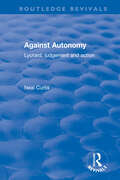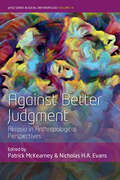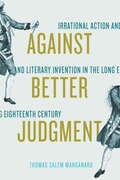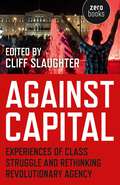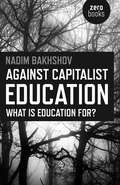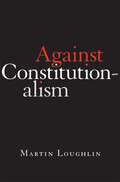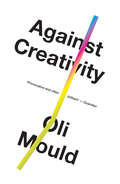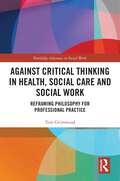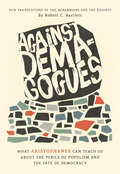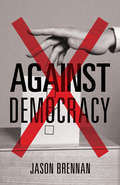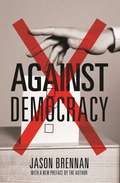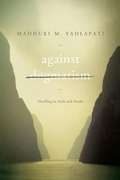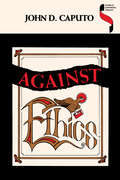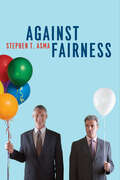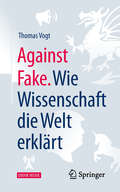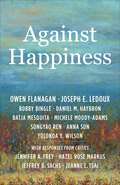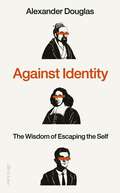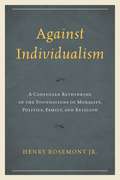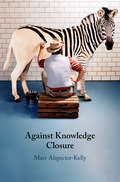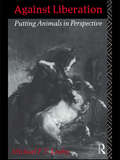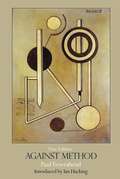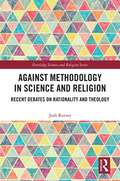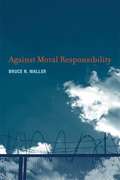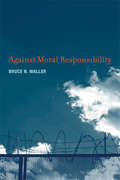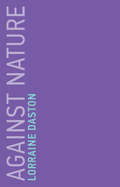- Table View
- List View
Against Autonomy: Lyotard, Judgement and Action (Routledge Revivals)
by Neal CurtisThis title was first published in 2001: Against Autonomy reassesses Jean-Francois Lyotard's contribution to philosophy and theory, and explores how his work challenges the privileged position of the principle of autonomy in contemporary liberal democratic thinking, as seen in such diverse thinkers as Rawls, Rorty and Fukuyama. Curtis argues that the political models autonomy legitimates are inadequate for thinking justice. Such models invariably promote self-legislation as the ground of freedom turning the subject away from its prior constitution by, and responsibility for, the Other. He explores Lyotard's reading of Kant as well as his responses to Levinas and Heidegger in order to rethink the political. Developing a regulative Idea based on new understandings of heteronomy and an-archy Curtis shows how Lyotard's argument that there are no criteria for justice does not mean judgement and action fall prey to decisionism and relativism, but that this lack of criteria commits us to a renewed sensitivity to events. Examining Lyotard's work in relation to Arendt's writings on the vita activa, this book explores themes of community, communication and action, suggesting how Lyotard's work calls for an alternative conception of political space. This book will be of particular interest to those studying communitarianism, liberalism, anarchism, post-structuralism and postmodernism, particularly within the context of political philosophy, ethics, and political and social theory. Neal Curtis is Lecturer in Communication Studies, Anglia Polytechnic University at Cambridge, UK
Against Better Judgment: Akrasia in Anthropological Perspectives (WYSE Series in Social Anthropology #14)
by Patrick McKearney Nicholas H.A. EvansAnthropologists have long explained social behaviour as if people always do what they think is best. But what if most of these explanations only work because they are premised upon ignoring what philosophers call 'akrasia' – that is, the possibility that people might act against their better judgment? The contributors to this volume turn an ethnographic lens upon situations in which people seem to act out of line with what they judge, desire and intend. The result is a robust examination of how people around the world experience weaknesses of will, which speaks to debates in both the anthropology of ethics and moral philosophy.
Against Better Judgment: Irrational Action and Literary Invention in the Long Eighteenth Century
by Thomas Salem ManganaroRobinson Crusoe recognizes it is foolish to leave for the open seas; nevertheless, he boards the ship. William Wordsworth of The Prelude sees the immense poetic task ahead of him, but instead of beginning work, he procrastinates by going for a walk. Centering on this sort of intentionally irrational action, originally defined as " akrasia" by the ancient Greeks and "weakness of will" in early Christian thought, Against Better Judgment argues that the phenomenon takes on renewed importance in the long eighteenth century.In treating human minds and bodies as systems and machines, Enlightenment philosophers did not account for actions that may be undermotivated, contradictory, or self-betraying. A number of authors, from Daniel Defoe and Samuel Johnson to Jane Austen and John Keats, however, took up the phenomenon in inventive ways. Thomas Manganaro traces how English novelists, essayists, and poets of the period sought to represent akrasia in ways philosophy cannot, leading them to develop techniques and ideas distinctive to literary writing, including new uses of irony, interpretation, and contradiction. In attempting to give shape to the ways people knowingly and freely fail themselves, these authors produced a new linguistic toolkit that distinguishes literature’s epistemological advantages when it comes to writing about people.
Against Capital: Experiences of Class Struggle and Rethinking Revolutionary Agency
by Cliff SlaughterThe problem is not how to manage the capital system, but to get rid of it&’. And who will do the job? These are the questions posed at the start of Cliff Slaughter&’s latest book. Recognising the importance of István Mészáros&’s analysis - in Beyond Capital (1995) and other books - of the historic, &‘structural crisis&’ that has taken capital into its stage of &‘destructive self-reproduction&’, Against Capital focuses on the crucial question of agency. Today, when there are fundamental disjunctures between the globalised economy, the means of social control and political and state structures, what are we to make of Marx&’s conclusion that the working class - capital&’s only structural antagonist - is &‘the gravedigger&’ of capitalism? And what are the implications for this of the information revolution, the changing composition of the working class, and the emergence of new forms of oppositional organisation, with young people to the fore? Slaughter assembles contributions by participants in recent movements in South Africa, Britain, Spain, Mexico, countries in the former Soviet zone and - in a major contribution from Yassamine Mather - the Middle East. He offers an extended critique of &‘vanguardist&’ conceptions such as Trotsky&’s &‘the crisis of humanity is reduced to the crisis of working-class revolutionary leadership&’ and Kautsky&’s and the early Lenin&’s formulation that socialist consciousness must be brought to the working class &‘from the outside&’. Finally, Against Capital examines the necessary theoretical foundations of a rebuilt working-class movement, with special attention to the concepts of class-consciousness and the relation between theory and practice. This book is a compelling and distinctive contribution to recent debates encompassing works such as Thomas Piketty&’s Capital in the Twenty-First Century (2014) and Paul Mason&’s PostCapitalism (2015).
Against Capitalist Education: What is Education for?
by Nadim BakhshovOut there in the so-called real world the education system is being crushed by the demands of capitalism and, in turn, is crushing those who pass through it, reducing them, diminishing them. The dream of the economic functioning unit. How do we break this? We need alternatives but not just one or two. We need the freedom and education to generate a trillion possibilities. An education system that is as broad as it is deep, that brings back a different type of thinking and a new use of fiction. This book signals the return of the dialogue and the conversation as the ground out of which new realities are born, the root out of which new alternatives are nurtured and explored.
Against Constitutionalism
by Martin LoughlinA critical analysis of the transformation of constitutionalism from an increasingly irrelevant theory of limited government into the most influential philosophy of governance in the world today. Constitutionalism is universally commended because it has never been precisely defined. Martin Loughlin argues that it is not some vague amalgam of liberal aspirations but a specific and deeply contentious governing philosophy. An Enlightenment idea that in the nineteenth century became America’s unique contribution to the philosophy of government, constitutionalism was by the mid-twentieth century widely regarded as an anachronism. Advocating separated powers and limited government, it was singularly unsuited to the political challenges of the times. But constitutionalism has since undergone a remarkable transformation, giving the Constitution an unprecedented role in society. Once treated as a practical instrument to regulate government, the Constitution has been raised to the status of civil religion, a symbolic representation of collective unity. Against Constitutionalism explains why this has happened and its far-reaching consequences. Spearheaded by a “rights revolution” that subjects governmental action to comprehensive review through abstract principles, judges acquire greatly enhanced power as oracles of the regime’s “invisible constitution.” Constitutionalism is refashioned as a theory maintaining that governmental authority rests not on collective will but on adherence to abstract standards of “public reason.” And across the world the variable practices of constitutional government have been reshaped by its precepts. Constitutionalism, Loughlin argues, now propagates the widespread belief that social progress is advanced not through politics, electoral majorities, and legislative action, but through innovative judicial interpretation. The rise of constitutionalism, commonly conflated with constitutional democracy, actually contributes to its degradation.
Against Creativity
by Oli MouldEverything you have been told about creativity is wrong.From line managers, corporate CEOs, urban designers, teachers, politicians, mayors, advertisers and even our friends and family, the message is 'be creative'. Creativity is heralded as the driving force of our contemporary society; celebrated as agile, progressive and liberating. It is the spring of the knowledge economy and shapes the cities we inhabit. It even defines our politics. What could possibly be wrong with this?In this brilliant, counter intuitive blast Oli Mould demands that we rethink the story we are being sold. Behind the novelty, he shows that creativity is a barely hidden form of neoliberal appropriation. It is a regime that prioritizes individual success over collective flourishing. It refuses to recognise anything - job, place, person - that is not profitable. And it impacts on everything around us: the places where we work, the way we are managed, how we spend our leisure time. Is there an alternative? Mould offers a radical redefinition of creativity, one embedded in the idea of collective flourishing, outside the tyranny of profit. Bold, passionate and refreshing, Against Creativity, is a timely correction to the doctrine of our times.
Against Critical Thinking in Health, Social Care and Social Work: Reframing Philosophy for Professional Practice (Routledge Advances in Social Work)
by Tom GrimwoodThis book stages a provocative dialogue between social work, health and social care and contemporary philosophy in order to inform theory and practice in a complex and challenging world. Today, the social world is marked by deep-rooted complexities, tensions and challenges. Health workers and social workers are constantly reminded to employ critical thinking to navigate this world through their practice. But given how many of these challenges pose significant problems for the theories that these subjects have traditionally drawn upon, should we now be critical of critical thinking – its assumptions, its basis, and its aspirations – itself? Arguing that health and social work theory must reconsider its deep-rooted assumptions about criticality in order to navigate complex neoliberalism, post-truth, and the relationship between language and late capitalism, it examines how the fusion of theory and practice can re-imagine critical thinking for health and social work in social work. It will be of interest to all scholars, students and professionals of social work and health and social care.
Against Demagogues: What Aristophanes Can Teach Us about the Perils of Populism and the Fate of Democracy, New Translations of the Acharnians and the Knights
by Prof. Robert C. BartlettTimeless comedies on resisting tyranny from one of history’s greatest comic playwrights. Against Demagogues presents Robert C. Bartlett's new translations of Aristophanes' most overtly political works, the Acharnians and the Knights. In these fantastically inventive, raucous, and raunchy comedies, the powerful politician Cleon proves to be democracy's greatest opponent. With unrivalled power, both plays make clear the dangers to which democracies are prone, especially the threats posed by external warfare, internal division, and class polarization. Combating the seductive allure of demagogues and the damage they cause, Against Demagogues disentangles Aristophanes' serious teachings from his many jokes and pratfalls, substantiating for modern readers his famous claim to "teach justice" while "making a comedy" of the city. The book features an interpretive essay for each play, expertly guiding readers through the most important plot points, explaining the significance of various characters, and shedding light on the meaning of the plays' often madcap episodes. Along with a contextualizing introduction, Bartlett offers extensive notes explaining the many political, literary, and religious references and allusions. Aristophanes' comedic skewering of the demagogue and his ruthless ambition—and of a community so ill-informed about the doings of its own government, so ready to believe in empty promises and idle flattery—cannot but resonate strongly with readers today around the world.
Against Democracy
by Jason BrennanMost people believe democracy is a uniquely just form of government. They believe people have the right to an equal share of political power. And they believe that political participation is good for us--it empowers us, helps us get what we want, and tends to make us smarter, more virtuous, and more caring for one another. These are some of our most cherished ideas about democracy. But, Jason Brennan says, they are all wrong.In this trenchant book, Brennan argues that democracy should be judged by its results--and the results are not good enough. Just as defendants have a right to a fair trial, citizens have a right to competent government. But democracy is the rule of the ignorant and the irrational, and it all too often falls short. Furthermore, no one has a fundamental right to any share of political power, and exercising political power does most of us little good. On the contrary, a wide range of social science research shows that political participation and democratic deliberation actually tend to make people worse--more irrational, biased, and mean. Given this grim picture, Brennan argues that a new system of government--epistocracy, the rule of the knowledgeable--may be better than democracy, and that it's time to experiment and find out.A challenging critique of democracy and the first sustained defense of the rule of the knowledgeable, Against Democracy is essential reading for scholars and students of politics across the disciplines.
Against Democracy: New Preface
by Jason BrennanMost people believe democracy is a uniquely just form of government. They believe people have the right to an equal share of political power. And they believe that political participation is good for us—it empowers us, helps us get what we want, and tends to make us smarter, more virtuous, and more caring for one another. These are some of our most cherished ideas about democracy. But Jason Brennan says they are all wrong.In this trenchant book, Brennan argues that democracy should be judged by its results—and the results are not good enough. Just as defendants have a right to a fair trial, citizens have a right to competent government. But democracy is the rule of the ignorant and the irrational, and it all too often falls short. Furthermore, no one has a fundamental right to any share of political power, and exercising political power does most of us little good. On the contrary, a wide range of social science research shows that political participation and democratic deliberation actually tend to make people worse—more irrational, biased, and mean. Given this grim picture, Brennan argues that a new system of government—epistocracy, the rule of the knowledgeable—may be better than democracy, and that it's time to experiment and find out.A challenging critique of democracy and the first sustained defense of the rule of the knowledgeable, Against Democracy is essential reading for scholars and students of politics across the disciplines. Featuring a new preface that situates the book within the current political climate and discusses other alternatives beyond epistocracy, Against Democracy is a challenging critique of democracy and the first sustained defense of the rule of the knowledgeable.
Against Dogmatism: Dwelling in Faith and Doubt
by Madhuri M. YadlapatiMany contemporary discussions of religion take an absolute, intractable approach to belief and non-belief, which privileges faith and dogmatism while treating doubt as a threat to religious values. As Madhuri M. Yadlapati demonstrates, however, there is another way: a faith (or non-faith) that embraces doubt and its potential for exploring both the depths and heights of spiritual reflection and speculation. Through three distinct discussions of faith, doubt, and hope, Yadlapati explores what it means to live creatively and responsibly in the everyday world as limited, imaginative, and questioning creatures. She begins with a perceptive survey of diverse faith experiences in Islam, Buddhism, Judaism, Hinduism, and Protestant Christianity, then narrows her focus to Protestant Christianity and Hinduism to explore how the great thinkers of those faiths have embraced doubt in the service of spiritual transcendence. Defending the rich tapestry of faith and doubt against polarization, Against Dogmatism reveals a spiritual middle way, an approach native to the long-standing traditions in which faith and doubt are interwoven in constructive and dynamic ways.
Against Ethics: Contributions to a Poetics of Obligation with Constant Reference to Deconstruction (Studies in Continental Thought)
by John D. CaputoA brilliant and witty postmodern critique of ethics, framed as a contemporary restaging of Kierkegaard’s Fear and Trembling.John D. Caputo undertakes a passionate, poetic, and satiric search for the basis of an ethics in the postmodern situation. Restaging Kierkegaard’s Fear and Trembling, Caputo defends the notion of obligation without ethics, of responsibility without the support of ethical foundations. Retelling the story of Abraham and Isaac, he strikes the pose of a postmodern-day Johannes de Silentio, accompanied by communications from such startling figures as Johanna de Silentio, Felix Sineculpa, and Magdalena de la Cruz. In dialogue with the thought of Kierkegaard, Nietzsche, Derrida, and Lyotard, Caputo forges a challenging, original account of what is possible and what is not possible for a continentalist ethics today.“Against Ethics is a bold work. . . . A counterethics whose multiple voices will be heard long after the trivializing arguments of many analytic ethicists have vanished and the arcane formulations of many postmoderns have been jettisoned.” —Edith Wyschogrod“Caputo provides a brilliant new analysis of the limits of ethics. . . . Essential reading for anyone concerned with the philosophical issues raised in postmodernity.” —Drucilla Cornell“One of the most important works on philosophical ethics written in recent years. . . . Caputo speaks with a passion and concern that are rare in academic philosophy.” —Mark C. Taylor“Against Ethics is beautifully written, clever, learned, thought-provoking, and even inspiring.” —Theological Studies“Writing in the form of his ideas, Caputo offers the reader a truly exquisite reading experience. . . . His iconic style mirrors a truly refreshing honesty that draws the reader in to play.” —Quarterly Journal of Speech
Against Fairness
by Stephen T. Asma“Mr. Asma offers a rightly critical diagnosis of our obsession with egalitarianism.” —The Wall Street JournalIn our zealous pursuit of fairness, we have banished our urges to like one person more than another, one thing over another, hiding them away as dirty secrets of our humanity. In Against Fairness, polymath philosopher Stephen T. Asma drags them triumphantly back into the light. Through playful, witty, but always serious arguments and examples, he vindicates our unspoken and undeniable instinct to favor, making the case that we would all be better off if we showed our unfair tendencies a little more kindness—indeed, if we favored favoritism.Conscious of the egalitarian feathers his argument is sure to ruffle, Asma makes his point by synthesizing a startling array of scientific findings, historical philosophies, cultural practices, analytic arguments, and a variety of personal and literary narratives to give a remarkably nuanced and thorough understanding of how fairness and favoritism fit within our moral architecture. Drawing on thinkers from Confucius to Tocqueville to Nietzsche, he reveals how we have confused fairness with more noble traits, like compassion and open-mindedness. He dismantles a number of seemingly egalitarian pursuits, from classwide Valentine’s Day cards to civil rights, to reveal the envy that lies at their hearts, going on to prove that we can still be kind to strangers, have no prejudice, and fight for equal opportunity at the same time we reserve the best of what we can offer for those dearest to us.Watch an animated book trailer here: http://www.youtube.com/watch?v=GjPhTQ9zi5Q
Against Fake. Wie Wissenschaft die Welt erklärt
by Thomas VogtDie moderne Wissenschaft ist ein faszinierendes Instrument zur Gewinnung von Erkenntnissen über Natur und Kultur. Ihre Ergebnisse sind zwar nicht frei von Widersprüchen, aber den meisten anderen Arten, Wissen zu erzeugen, überlegen. Das liegt an bestimmten Regeln, über die sich Wissenschaftler verständigt haben. Ein zentrales Prinzip von Wissenschaft ist Transparenz. Der Weg zum Wissen soll für alle nachvollziehbar sein, die bereit sind, sich in einen bestimmten Wissensbereich einzuarbeiten. Debatten um Fake News und Alternative Fakten zeigen, wie wichtig transparent erzeugtes Wissen ist. Dabei kann nicht genug betont werden, dass die moderne Wissenschaft als Reaktion auf Aberglauben und Fake entstanden ist. Einen Einstieg in das Thema Wissenschaft zu finden ist schwer, denn das Prinzip der Transparenz darf leider nicht mit Verständlichkeit gleichgesetzt werden. Ziel des Buches ist es, die Idee von Wissenschaft auch Lesern ohne Vorkenntnisse näherzubringen.
Against Happiness
by Owen Flanagan Batja Mesquita Anna Sun Joseph E. LeDoux Daniel M. Haybron Michele Moody-Adams Bobby Bingle Songyao Ren Yolonda Y. WilsonThe “happiness agenda” is a worldwide movement that claims that happiness is the highest good, happiness can be measured, and public policy should promote happiness. Against Happiness is a thorough and powerful critique of this program, revealing the flaws of its concept of happiness and advocating a renewed focus on equality and justice.Written by an interdisciplinary team of authors, this book provides both theoretical and empirical analysis of the limitations of the happiness agenda. The authors emphasize that this movement draws on a parochial, Western-centric philosophical basis and demographic sample. They show that happiness defined as subjective satisfaction or a surplus of positive emotions bears little resemblance to the richer and more nuanced concepts of the good life found in many world traditions. Cross-cultural philosophy, comparative theology, and social and cultural psychology all teach that cultures and subcultures vary in how much value they place on life satisfaction or feeling happy. Furthermore, the ideas promoted by the happiness agenda can compete with rights, justice, sustainability, and equality—and even conceal racial and gender injustice.Against Happiness argues that a better way forward requires integration of cross-cultural philosophical, ethical, and political thought with critical social science. Ultimately, the authors contend, happiness should be a secondary goal—worth pursuing only if it is contingent on the demands of justice.
Against Identity: The Wisdom of Escaping the Self
by Alexander Douglas‘Deeply interesting … a superb critique of contemporary self-obsession’ Steven Poole, Guardian'Engrossing … bracing … incendiary and timely’ Stuart Jeffries, Daily TelegraphA philosopher explains why the search for identity is meaningless, and how we should escape the self Modern life encourages us to pursue the perfect identity. Whether we aspire to become the best lawyer or charity worker, life partner or celebrity influencer, we emulate exemplars that exist in the world – hoping it will bring us happiness. But this often leads to a complex game of envy and pride. We achieve these identities but want others to imitate us. We disagree with those whose identities contradict ours – leading to polarisation and even violence. And yet when they thump against us, we are ashamed to ring hollow.In Against Identity, philosopher Alexander Douglas seeks an alternative wisdom. Searching the work of three thinkers – ancient Chinese philosopher Zhuangzi, Dutch Enlightenment thinker Benedict de Spinoza, and 20th Century French theorist René Girard – he explores how identity can be a spiritual violence that leads us away from truth.Through their worlds and radically different cultures, we discover how, at moments of historical rupture, our hunger for being grows: and yet, it is exactly these times when we should make peace with our indeterminacy and discover the freedom of escaping our selves.‘Lucid and absorbing … One of my highlight books of the year’ Stuart Kelly, Scotsman
Against Individualism: A Confucian Rethinking of the Foundations of Morality, Politics, Family, and Religion
by Henry RosemontThe first part of Against Individualism: A Confucian Rethinking of the Foundations of Morality, Politics, Family, and Religion is devoted to showing how and why the vision of human beings as free, independent and autonomous individuals is and always was a mirage that has served liberatory functions in the past, but has now become pernicious for even thinking clearly about, much less achieving social and economic justice, maintaining democracy, or addressing the manifold environmental and other problems facing the world today. In the second and larger part of the book Rosemont proffers a different vision of being human gleaned from the texts of classical Confucianism, namely, that we are first and foremost interrelated and thus interdependent persons whose uniqueness lies in the multiplicity of roles we each live throughout our lives. This leads to an ethics based on those mutual roles in sharp contrast to individualist moralities, but which nevertheless reflect the facts of our everyday lives very well. The book concludes by exploring briefly a number of implications of this vision for thinking differently about politics, family life, justice, and the development of a human-centered authentic religiousness. This book will be of value to all students and scholars of philosophy, political theory, and Religious, Chinese, and Family Studies, as well as everyone interested in the intersection of morality with their everyday and public lives.
Against Knowledge Closure
by Marc Alspector-KellyKnowledge closure is the claim that, if an agent S knows P, recognizes that P implies Q, and believes Q because it is implied by P, then S knows Q. Closure is a pivotal epistemological principle that is widely endorsed by contemporary epistemologists. Against Knowledge Closure is the first book-length treatment of the issue and the most sustained argument for closure failure to date. Unlike most prior arguments for closure failure, Marc Alspector-Kelly's critique of closure does not presuppose any particular epistemological theory; his argument is, instead, intuitively compelling and applicable to a wide variety of epistemological views. His discussion ranges over much of the epistemological landscape, including skepticism, warrant, transmission and transmission failure, fallibilism, sensitivity, safety, evidentialism, reliabilism, contextualism, entitlement, circularity and bootstrapping, justification, and justification closure. As a result, the volume will be of interest to any epistemologist or student of epistemology and related subjects.
Against Liberation: Putting Animals in Perspective
by Michael P. LeahyThe Western world is currently gripped by an obsessive concern for the rights of animals - their uses and abuses. In this book, Leahy argues that this is a movement based upon a series of fundamental misconceptions about the basic nature of animals.This is a radical philosophical questioning of prevailing views on animal rights, which credit animals with a self-consciousness like ours. Leahy's conclusions have implications for issues such as bloodsports, meat eating and fur trading.
Against Method
by Paul FeyerabendPaul Feyerabend's globally acclaimed work, which sparked and continues to stimulate fierce debate, examines the deficiencies of many widespread ideas about scientific progress and the nature of knowledge. Feyerabend argues that scientific advances can only be understood in a historical context. He looks at the way the philosophy of science has consistently overemphasized practice over method, and considers the possibility that anarchism could replace rationalism in the theory of knowledge. This updated edition of the classic text includes a new introduction by Ian Hacking, one of the most important contemporary philosophers of science. Hacking reflects on both Feyerabend's life and personality as well as the broader significance of the book for current discussions.
Against Methodology in Science and Religion: Recent Debates on Rationality and Theology (Routledge Science and Religion Series)
by Josh ReevesSince its development as a field over the last part of the twentieth century, scholars in science and religion have been heavily concerned with methodological issues. Following the lead of Thomas Kuhn, many scholars in this interdisciplinary field have offered proposals that purport to show how theology and science are compatible by appropriating theories of scientific methodology or rationality. Arguing against this strategy, this book shows why much of this methodological work is at odds with recent developments in the history and philosophy of science and should be reconsidered. Firstly, three influential methodological proposals are critiqued: Lakatosian research programs, Alister McGrath’s "Scientific Theology" and the Postfoundationalist project of Wentzel van Huyssteen. Each of these approaches is shown to have a common failing: the idea that science has an essential nature, with features that unite "scientific" or even "rational" inquiry across time or disciplines. After outlining the issues this failing could have on the viability of the field, the book concludes by arguing that there are several ways scholarship in science and religion can move forward, even if the terms "science" and "religion" do not refer to something universally valid or philosophically useful. This is a bold study of the methodology of science and religion that pushes both subjects to consider the other more carefully. As such, it will be of great interest to scholars in religious studies, theology and the philosophy of science.
Against Moral Responsibility
by Bruce N. WallerIn Against Moral Responsibility, Bruce Waller launches a spirited attack on a system that is profoundly entrenched in our society and its institutions, deeply rooted in our emotions, and vigorously defended by philosophers from ancient times to the present. Waller argues that, despite the creative defenses of it by contemporary thinkers, moral responsibility cannot survive in our naturalistic-scientific system. The scientific understanding of human behavior and the causes that shape human character, he contends, leaves no room for moral responsibility. Waller argues that moral responsibility in all its forms--including criminal justice, distributive justice, and all claims of just deserts--is fundamentally unfair and harmful and that its abolition will be liberating and beneficial. What we really want--natural human free will, moral judgments, meaningful human relationships, creative abilities--would survive and flourish without moral responsibility. In the course of his argument, Waller examines the origins of the basic belief in moral responsibility, proposes a naturalistic understanding of free will, offers a detailed argument against moral responsibility and critiques arguments in favor of it, gives a general account of what a world without moral responsibility would look like, and examines the social and psychological aspects of abolishing moral responsibility. Waller not only mounts a vigorous, and philosophically rigorous, attack on the moral responsibility system, but also celebrates the benefits that would result from its total abolition.
Against Moral Responsibility
by Bruce N. WallerA vigorous attack on moral responsibility in all its forms argues that the abolition of moral responsibility will be liberating and beneficial.In Against Moral Responsibility, Bruce Waller launches a spirited attack on a system that is profoundly entrenched in our society and its institutions, deeply rooted in our emotions, and vigorously defended by philosophers from ancient times to the present. Waller argues that, despite the creative defenses of it by contemporary thinkers, moral responsibility cannot survive in our naturalistic-scientific system. The scientific understanding of human behavior and the causes that shape human character, he contends, leaves no room for moral responsibility.Waller argues that moral responsibility in all its forms—including criminal justice, distributive justice, and all claims of just deserts—is fundamentally unfair and harmful and that its abolition will be liberating and beneficial. What we really want—natural human free will, moral judgments, meaningful human relationships, creative abilities—would survive and flourish without moral responsibility. In the course of his argument, Waller examines the origins of the basic belief in moral responsibility, proposes a naturalistic understanding of free will, offers a detailed argument against moral responsibility and critiques arguments in favor of it, gives a general account of what a world without moral responsibility would look like, and examines the social and psychological aspects of abolishing moral responsibility. Waller not only mounts a vigorous, and philosophically rigorous, attack on the moral responsibility system, but also celebrates the benefits that would result from its total abolition.
Against Nature (Untimely Meditations #17)
by Lorraine DastonA pithy work of philosophical aMassachusetts Institute of Technologynthropology that explores why humans find moral orders in natural orders.Why have human beings, in many different cultures and epochs, looked to nature as a source of norms for human behavior? From ancient India and ancient Greece, medieval France and Enlightenment America, up to the latest controversies over gay marriage and cloning, natural orders have been enlisted to illustrate and buttress moral orders. Revolutionaries and reactionaries alike have appealed to nature to shore up their causes. No amount of philosophical argument or political critique deters the persistent and pervasive temptation to conflate the “is” of natural orders with the “ought” of moral orders.In this short, pithy work of philosophical anthropology, Lorraine Daston asks why we continually seek moral orders in natural orders, despite so much good counsel to the contrary. She outlines three specific forms of natural order in the Western philosophical tradition—specific natures, local natures, and universal natural laws—and describes how each of these three natural orders has been used to define and oppose a distinctive form of the unnatural. She argues that each of these forms of the unnatural triggers equally distinctive emotions: horror, terror, and wonder. Daston proposes that human reason practiced in human bodies should command the attention of philosophers, who have traditionally yearned for a transcendent reason, valid for all species, all epochs, even all planets.
